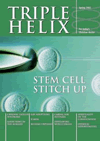It has been said that if there is just a five per cent advantage in clinical benefit from a certain treatment, then the advantages and disadvantages of this should be discussed with patients. There is now growing evidence that having a religious faith brings considerable advantages. Have we come to the position when it could be considered negligent not to advise our patients to find a faith that stands to help them?
'Realised Religion' is a scholarly book that comprehensively reviews the large volume of literature on the relationship between faith and well-being, whether it be physical or psychological. The effect of both pro and anti religious biases in the writers of these papers is discussed.
The first chapter on the 'Role of Prayer and Healing' reviews several academic studies. Most found a real advantage in the group prayed for, only a few found no difference.
Articles on 'Faith Healing' are reviewed honestly. Though little evidence is given to suggest patients are being objectively healed of organic pathology today, there is evidence presented that patients can have a feeling of well-being from such experiences. One major study found that the problems helped were usually psychological, physical or religious as opposed to behavioural, social and moral concerns. A major analysis of Catholic Pentecostal healings determined that the healings actually fell well short of 'cures'. However religious faith is correlated with lower blood pressure levels!
The chapter on 'Mental Health' shows clearly that committed, actively religious persons have better overall psychological adjustment, feeling of well-being and high self esteem. They conclude, “Mental Health workers need to be aware of the positive potential of religious involvement”. Overall 'fully eighty per cent of psychiatric research on religion and health conclude that a faith is advantageous'.
Many studies in 'Life Satisfaction' all show that there is a direct relationship between spiritual commitment and contentment. A number of studies conclude that 'materialistic people generally have been found to be unhappy'. This sense of well-being is accredited to the effect of individual beliefs as well as from active involvement in religious communities and activities.
Further chapters review the evidence on the effect of faith on suicide and alcohol and drug abuse and find clear evidence that faith is advantageous.
The writers conclude, 'The scientific evidence convincingly demonstrates that the natural by-product of religion realised in longer life, less illness, better physical and mental health, more marital stability, less divorce, less suicide and less abuse of alcohol and other substances'.
The final chapter is an investigation of the Bible's teaching and reminds us that the pursuit of religious truth and commitment should not be because of health benefits because then religion has become a means to an end since 'Jesus never promoted or advocated such a reversal'. This book is really a summary of large numbers of trials and surveys. The evidence is strong that doctors should be helping their patients find a vibrant meaningful faith.
Reviewed by:
Bernard Palmer
Consultant General Surgeon in Stevenage































